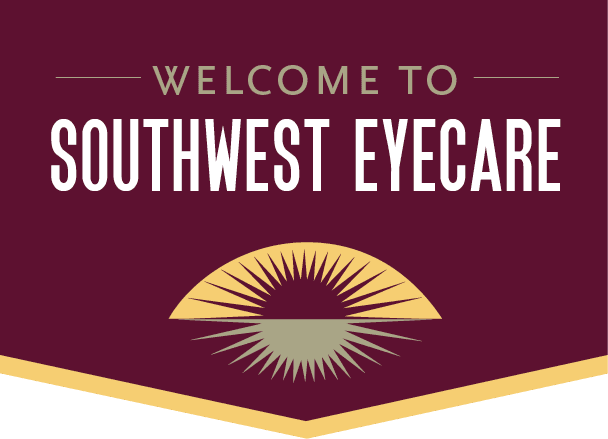Glaucoma is a condition that is sometimes known as the “silent blinder” because it usually has no symptoms until damage has been done. It is one of the leading causes of blindness in the US, and once it has caused enough injury to the optic nerve, it’s irreversible.
However, you aren’t helpless against this diagnosis. With proper glaucoma care, there is a lot you and your doctor can do to keep your eyes healthy. The ophthalmologists at Southwest Eyecare have helped many patients with glaucoma. Here is what you need to know about glaucoma and what you can do to protect yourself.
What is Glaucoma?
There are different types of glaucoma, but no matter which kind you may be dealing with, it’s a chronic, progressive disease that causes vision loss due to optic nerve damage. In most cases, this damage is caused by a buildup of fluid in the eye, which increases pressure against the delicate optic nerve.
What are the types of glaucoma?
Glaucoma is caused by a buildup of fluid inside the eye. This fluid is created when there is a problem with the drainage system in the eye. This problem can happen in several different ways.
- Open-Angle Glaucoma is caused by damage to the filter in the eye’s drainage canals. Open-Angle Glaucoma is the most common form of glaucoma.
- Angle-Closure Glaucoma is caused when the iris bulges, blocking the drainage canals between the iris and cornea.
- Low- or Normal-Tension Glaucoma is when there is damage to the optic nerve even though the pressure in the eye is within the normal range.
- Congenital Glaucoma occurs in infants with congenital defects in the eye’s drainage canals.
- Uveitic or Inflammatory Glaucoma is caused by inflammatory or autoimmune disorders.
- Neovascular Glaucoma is caused by conditions that damage the blood vessels, such as diabetes.
What causes glaucoma?
As you can see from the different types of glaucoma, each form of the disease has a different cause. While most of the time, the damage is caused by increased pressure in the eye; it can also happen when the pressure is normal. It is important to be thoroughly evaluated by an ophthalmologist to determine the cause and the best treatment for you.
What are the symptoms of glaucoma?
For most types of glaucoma, the first symptom people experience is a loss of vision. They typically notice blurring or darkness around the edges of what they see. They may also become sensitive to light or see rainbow halos around lights. The exception is Acute-Closure Glaucoma. Because the pressure builds so quickly in this type, people may experience severe eye pain, headache, nausea, and vomiting.
For the most part, however, glaucoma has no symptoms until the damage has already occurred. Regular eye exams are the only reliable way to detect glaucoma before the optic nerve is irreversibly damaged.
What are the risk factors for glaucoma?
Anyone can develop glaucoma. However, certain conditions raise your risk, such as:
- A family history of glaucoma
- High intraocular pressure
- Being over 55 years old
- Medical conditions, including diabetes, high blood pressure, migraines, and sickle cell anemia
- Black, Asian, or Hispanic ancestry
- Extreme far- or nearsightedness
What’s the treatment for glaucoma?
The best treatment plan is determined b your doctor based on several factors. These include your type of glaucoma, your medical history, age, the severity of your condition, and procedures you’re willing to try.
Glaucoma cannot be cured, but treatment can usually control it, preserving your vision. Treatment options include medication, surgery, laser surgery, and cataract removal. For the most effective treatment, more than one approach may be needed.
Take Action with Early Detection and Management at Southwest Eyecare
Although an optometrist can detect glaucoma during a basic eye exam, it is best to see an ophthalmologist for the most thorough evaluation and treatment options. The skilled professionals at Southwest Eyecare have the training and experience to give your eyes the care they deserve. If you live in the Albuquerque, New Mexico, area and would like more information or to schedule an appointment, contact us today!
Image Source: Michail Petrov / Shutterstock

